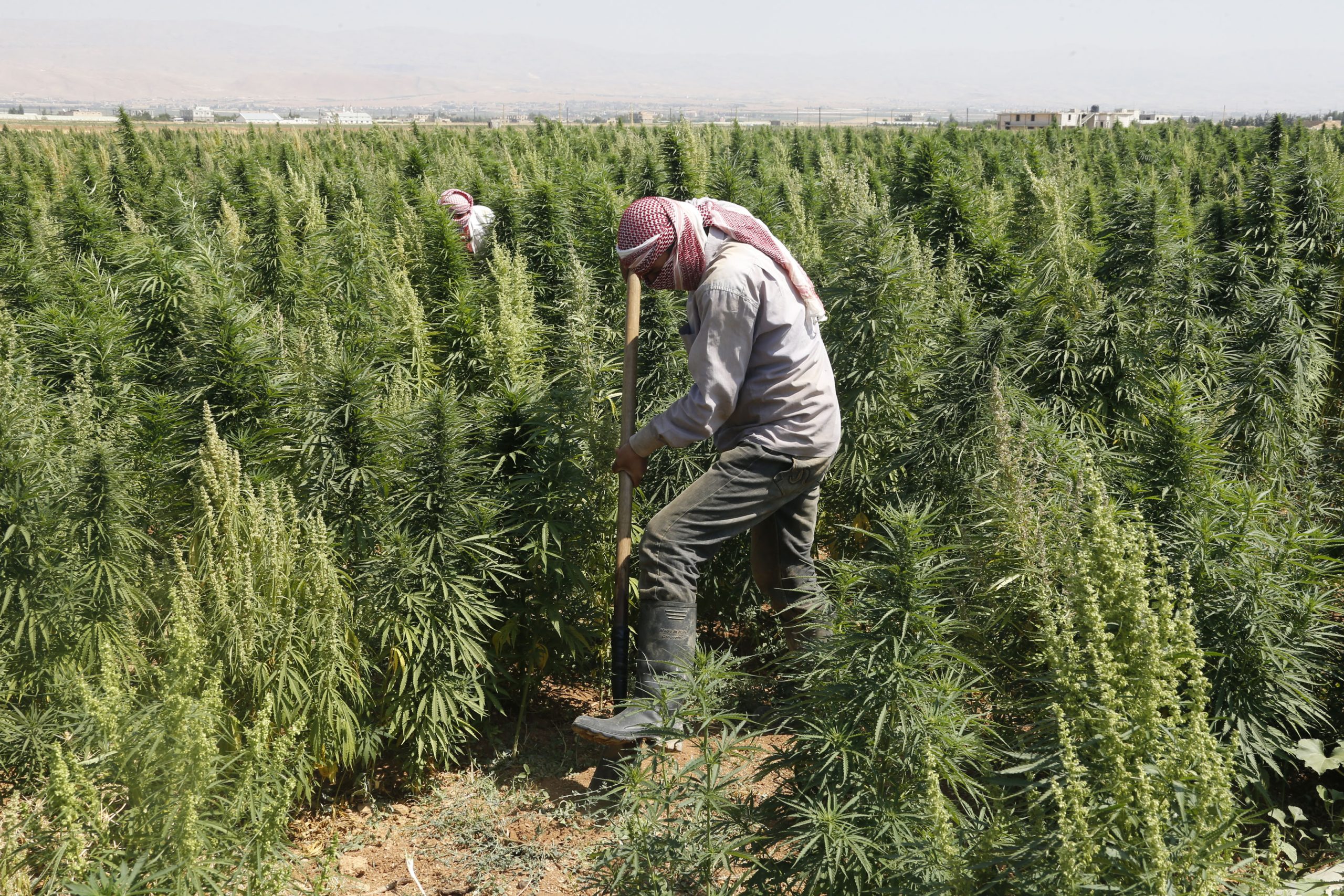Publications
INSS Insight No. 1681, January 19, 2023
Against the background of unprecedented economic crises, a thriving industry of drug production and smuggling has developed in Syria and Lebanon. Syria has become a narco-state under the auspices of the regime, for which drug revenues are a principal source of income; revenues are also important for elements in Lebanon, chief among them Hezbollah. The main drug traded is Captagon, an addictive member of the amphetamine family – also known as “Captain Courage,” “poor man’s cocaine,” and “the jihad drug,” due to its wide use by fighters in Syria, including ISIS. This problem could potentially undermine the already fragile stability of the region and even leak into Israel. Israel’s enlistment in the region’s fight against the problem, with United States backing, could benefit it in several ways.
The spread of drugs in Syria and even more so in Lebanon is not new. Back in the 1950s and 1960s Lebanon was known as a source of cannabis, which is still grown there, and drug trade has been a source of income for Hezbollah since the 1990s. The organization has sent activists to join the drug cartels in Central and South America, which have developed networks to smuggle and distribute cocaine in the United States (through Mexico) and Europe (through Africa).
The economic crises in Syria and Lebanon have intensified since 2019, and compounded by the limited governance in these countries, explain the growth of the phenomenon. The drug lords exploit the poverty of the local residents, who are prepared to work in the drug industry and trade in order to support their families. The Syrian regime is involved by virtue of its effort to find illegal sources of income, partly due to the economic sanctions imposed on it. In 2022, drug exports from Syria yielded about $25-30 billion; in contrast, annual revenues from legal exports are about $800 million. One pill costs at most 3 cents to produce, so profits are considerable. In Syria and Lebanon, the drug is sold for $1-2, while in Saudi Arabia the price rises to $25.
Since 2018, the drug industry in Syria has been managed by the regime itself, by means of operatives from the state’s military and security entities and Hezbollah, and above all, with the help of Division 4 – an elite unite commanded by Maher el-Assad, Bashar’s younger brother, who is responsible for the security of the drug’s production and supply chain. Also involved are families from Assad’s close circle and businesspeople, such as those from the food and packaging industry, who have converted some of their activity to drug dealing. Army bases and factories that were once used to make chemical weapons are now used to make Captagon, and laboratories are located in Aleppo, Homs, Hama, Tartus, and Latakia near the coast, areas under the control of the regime. The laboratories send quantities of hashish and Captagon to Alawi coastal areas, and most are smuggled from Latakia port to Lebanon and various destinations worldwide.
In Lebanon, Hezbollah generally denies involvement in the drug trade, particularly in view of the religious ban on producing, distributing, selling, and using drugs. In the past, some members of the organization clarified that the sale of drugs to “enemies” is permitted, although Nasrallah himself takes every opportunity to deny any involvement in this activity. The area close to the Syrian border and controlled by Hezbollah has become a focus for the production and smuggling of Captagon pills since the start of the Syrian war. Cheap production occurs in small laboratories, which can make thousands of pills an hour, using machinery available on the open market designed to make confectionary and chemical materials. The main focus of the activity is around the small town of Tfail, close to the Syrian border, which has been taken over by Lebanese drug lord Hassan Mahmoud Dako, known as the Captagon King (who arrived in Lebanon from Syria). Dako took control of agricultural areas cultivated by locals, operating under the protection of Hezbollah, which has taken control of the entire area and border crossings between Lebanon and Syria. Hezbollah, which also lends patronage to other drugs lords, works in close cooperation with the Syrian Division 4. In some cases, the drugs are transported through Syria and in other cases through Lebanese seaports and airports.
From Syria and Lebanon to the Middle East and Beyond
Just as the phenomena of refugees and terror spilled over beyond Syria’s borders to its neighbors, so too the Captagon pills are transported over land borders to neighboring countries – Iraq, Lebanon, and Jordan – taking advantage of the poor governance in Syria. The main object of Syrian and Lebanese drug smugglers are the Gulf states – the richest market in the Arab world, with the emphasis on Saudi Arabia, considered the leading Arab drug consumer and the fourth largest in the world. Some claim that drug smuggling is an attempt by the Syrian regime to undermine Riyadh’s stability or to pressure it to resume diplomatic ties in return for Syrian efforts to block the drugs. The main fear of governments in the region is that the Syrian smuggling networks will become a platform for more dangerous drugs, such as crystal meth, a particularly addictive methamphetamine.
In mid-2021 drug smuggling from Lebanon led to a severe crisis in relations with Saudi Arabia and other Gulf states, following a series of foiled smuggling attempts. In April 2022, when an attempt to smuggle 5 million Captagon pills to Saudi Arabia hidden in agricultural produce (pomegranates) was foiled, the Saudis banned agricultural imports from Lebanon, hinting at Hezbollah involvement in the smuggling. The Lebanese, fearing damage to the agricultural sector (which exports most of its produce to the Arabian Peninsula), took a number of steps to increase security supervision and prevent smuggling, and the ban was lifted, although the smuggling continued. External pressure on Lebanon also led to arrests of accused drug makers and dealers, including Hassan Mahmoud Dako, who was arrested and sentenced several times. He was recently handed a long prison sentence, although he continues to run his empire with the help of friends in Hezbollah.

Jordan, as the gateway to the Gulf states, is a central target for smuggling, with a volume that doubled in 2022. The Hashemite Kingdom, which already suffers from instability, is at the forefront of the fight against imported drugs, but apart from being a transit station, over the past year Jordan has itself become a consumer of drugs, and about a fifth of the drugs smuggled into its territory are consumed in Jordan, where Captagon is sold cheaply ($2-3 a pill). Indeed, the Jordanian security forces invest considerable efforts in attempts to stop the smuggling, and last year several clashes between the Jordanian army and drug smugglers from Syria were reported, with large amounts of Captagon, hashish, and Kalashnikov weapons seized. According to the Jordanians, these are Syrians with military training, some of whom are equipped with gliders and drones. The Jordanians know that the smuggling is done with the support of the Syrian army and pro-Iranian militias, and are worried by the security and social consequences of the activity, which as they see it derives from the desire to damage the social fabric in the kingdom.
The drugs also reach Egypt. The customs authorities in Cairo have decided to tighten their procedures at all ground, sea and air ports for containers and goods arriving from Syria and Lebanon, in order to prevent the entry of drugs and other narcotic substances into the country.
Nor does drug smuggling from Syria and Lebanon does not stop in Middle East; rather, it continues on to Europe – Italy, Greece and Spain – and Malaysia. In fact, about 80 percent of Captagon distributed around the world originates in Syria.
The two great powers present in Syria, Russia and the United States, are working with a low profile to curb this phenomenon. Russia, for example, often thwarts attempts by means of military patrols in southern Syria, close to the Jordanian border. For many years, the United States did not have a clear position on how to combat drug smuggling. However, in December 2022, the US Congress decided to approve a law against Captagon, intended to break up the Syrian regime’s drug production and dealing networks, and to grant support to allies in the region where large quantities of Captagon are smuggled. Once approved by the President, the law will be incorporated in the US defense budget for 2023. The United States has joined the struggle due to its fear that the drugs will increase regional instability, and a fear that the drugs will reach its own territory because of the links between the Syrian regime and Hezbollah with the drugs cartels in Central America.
In conclusion, Syria’s harsh situation in recent years has led to it becoming a “narco-state” – a hub for the production and smuggling of Captagon pills to the Middle East and to Europe under the clear auspices of the regime and in close cooperation with Hezbollah. The organization too is beset by economic difficulties, and uses the area on the shared Syrian-Lebanese border, which is under its control, for the drug industry.
The IDF presence along the Syrian and Lebanese border prevents the spread of this phenomenon into Israeli territory, and most smuggling attempts are foiled. This must continue, with an effort to raise awareness of the drug activity in the regional and international arena. Furthermore, the concern common to all countries in the region, of the spread of the problem to their territory, is an opportunity to extend cooperation in this area with the Gulf states and particularly with Jordan, which needs Israeli assistance. Regional cooperation will contribute to Israel’s image as a positive and stabilizing element in the area and could also support the shared objective of weakening the Shiite axis, which benefits from the huge revenues reaped through illegal drug trade.



